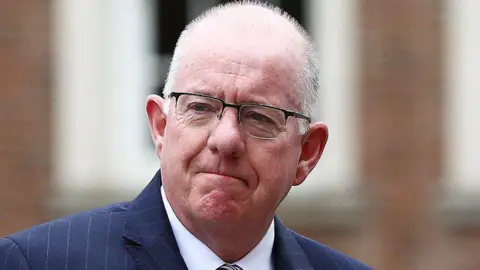Ireland should have had 'parallel' Omagh inquiry - Flanagan
 PA
PAA former Irish government minister is concerned vital evidence may not be seen by the public inquiry into the 1998 Omagh bomb.
Charlie Flanagan believes Ireland should have established its own parallel inquiry.
Twenty-nine people, including a woman expecting twins, were killed in the Real IRA attack, which was carried out from the Irish Republic.
Dublin has promised to help the UK inquiry into whether the bombing could have been prevented. It has pledged that, if required, it will pass legislation to address co-operation.
But that has yet to occur and relatives of some of those murdered remain concerned.
The public inquiry, which opened on Tuesday, seeks to determine whether the bombing could have been prevented by UK state authorities.
The inquiry cannot compel anyone from outside the UK to give evidence, such as current or former members of An Garda Siochána (Irish police).
The intelligence picture – north and south – is a key area for the inquiry.
'Lost opportunity'
Mr Flanagan, formerly Ireland's minister for justice and minster for foreign affairs, told Irish broadcaster RTÉ that a parallel inquiry would have been "imminently desirable".
He added: "I accept fully what (Taoiseach) Micháel Martin and (Tánaiste) Simon Harris have consistently said about the Irish government co-operating fully with the inquiry.
"But I think an opportunity has been lost by not having a parallel process."
Mr Flanagan said an Irish inquiry could have worked "a tandem" with the one in the UK.
"My fear now is that there will be gaps.
"While the Irish government says it will not be found wanting, my concern is we will not be able to square that circle on compellability and that vital evidence may not be forthcoming," Mr Flanagan said.
Sinn Féin leader Mary Lou McDonald said she agreed with Mr Flanagan, as well as the families who had called for a separate inquiry to be held.
"There is clearly a challenge and an issue in terms of compellability, so we need to do everything that is necessary to make sure that this inquiry is successful," the leader of the largest opposition party in the Dáil (lower house of Irish parliament) told RTÉ's This Week programme.
McDonald said action should be taken by the government "without delay".
